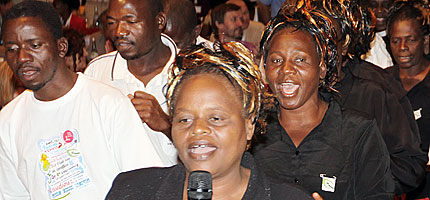Members of the Betseranai Choir, Evangelical Lutheran Church in Zimbabwe, sing at the start of the Eleventh Assembly public hearing. The 20-voice choir is composed of persons living with HIV. © LWF/J. Latva-Hakuni
25.07.2010
Daily bread out of reach for many
Further action needed in global response to HIV and AIDS
STUTTGART, Germany, 25 July 2010 – “Injustice, poverty, gender violence, stigma and discrimination continue the suffering and vulnerability of the poor and powerless, especially girls, youth and women,” said Dr Veikko Munyika, coordinator of the Lutheran World Federation (LWF) AIDS campaign. Even as the global response to HIV and AIDS is beginning to “bear some fruit,” daily bread is out of reach for many, he told delegates at the Eleventh Assembly during a public hearing this afternoon.
Munyika called for more focused action by LWF member churches, and shared startling statistics about the continued rise of HIV and AIDS. For every person beginning to receive life-saving treatments, there are five new HIV infections, he said. “Our churches have some beautiful programs but it seems we need to do more, especially in the area of prevention.”
He called on member churches to join in intensifying efforts towards awareness and advocacy on HIV and AIDS. “We call on you, brothers and sisters, especially church leaders, to join us in intensifying efforts.”
Zimbabwean choir reminds leaders to “keep the promise”
The Zimbabwean Betseranai Choir, of the Evangelical Lutheran Church in Zimbabwe, used their voices to bring messages about HIV and AIDS to the Assembly. In the song composed by director Paul Maphosa, “Stop AIDS, Keep the Promise,” the choir sang about the promises community and church leaders have made to fight AIDS, and asks them to “keep the promise.” The song laments that people are still suffering and asks when deliverance from this deadly affliction will come.
The 20-voice choir is composed of persons living with HIV. They sing about the problems and challenges of living with the sickness, and remind church and community groups, the government of Zimbabwe, the media, employers and employees honor their declarations of commitment to work towards the prevention of HIV and AIDS.
“We are here to give a face to the HIV infection,” said one member of the choir. Through our music, the choir wants to raise awareness about HIV and AIDS. In rural areas the sickness leads to injustice, poverty, stigmatization and gender-based violence. Women and girls are especially affected.”
The wish for an HIV-free generation
Speaking on behalf of the many millions of people affected by HIV and AIDS, several individuals – many of whom are HIV-positive – shared their personal stories with the Assembly. They told of signs of hope and demonstrated that, while being HIV-positive, they were alive, productive and should be allowed to enjoy human rights like everyone else.
Sukhulile Mhere’s greatest wish is “to see the creation of an HIV-free generation.” He shared with the Assembly how he and his wife are living with HIV. Diagnosed when he was single and in his early 30s, Mhere was told by many, including his own parents, that he should never consider marriage as “he was about to die.” Through counseling he came to understand that he had a right to love and to be loved and “even have a family.”
“I met and fell in love with someone who [is] also HIV-positive,” said Mhere, who is now 40. His wife recently gave birth to “bubbling baby girl,” he boasted.
Mhere and his wife have to wait for their daughter to turn nine months before she can have HIV testing, but in the meantime, the experience of having a child has shown him “that being HIV-positive is not the end but only the beginning.”
When Anthony Samy was diagnosed with HIV in 1990 there was little awareness of HIV and AIDS, let alone counseling services, available for him or his family. “Many people, including doctors, advised my wife to leave me and get a separation.”
Twenty years later, Samy and his wife remain committed to their marriage and have two grown children. He lends his time to assist with counseling people about HIV risks and helping those who have tested positive with employment, reuniting broken families and admitting orphan children in the hostels.
Samy called on delegates to avoid stigmatizing and discriminating against HIV-positive people. “Show your love and affection,” he urged. “If possible, give care and support to them in all ways and kindly see the Christ in them as well.” (694 words)

